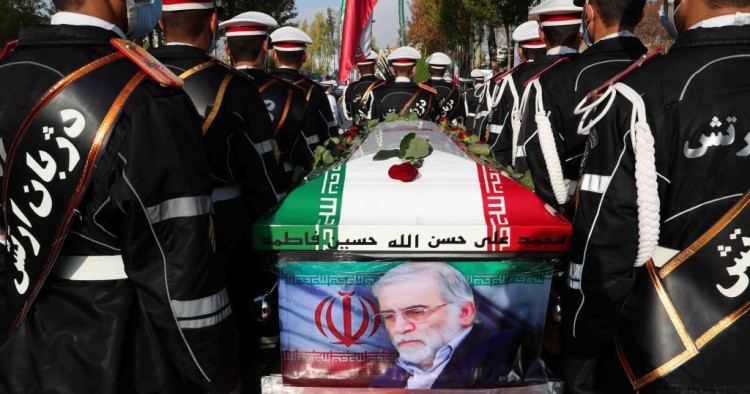This week's briefing on recent news and upcoming events in the region featuring Alex Vatanka, Gonul Tol, Gerald Feierstein, and Dr. Marwa Maziad.
Iranian leaders vow revenge, but retaliation is unlikely to be swift
Alex Vatanka
Director of Iran Program and Senior Fellow, Frontier Europe Initiative

Officials in Tehran continue to scramble to explain how a top nuclear scientist was assassinated in the Iranian capital. Conflicting official reports are all about saving face since no one can deny the spectacular counter-intelligence failure that the killing of Mohsen Fakhrizadeh represents. Iranian leaders have in the past bragged about controlling four Arab capitals (Baghdad, Beirut, Damascus, and Saana), but they are clearly not in full control of Tehran.
The Iranian leadership blames Israel and the Israelis have not denied killing Fakhrizadeh. In Tehran and rest of the Middle East, the consensus more or less is that Israel was pursuing several objectives: from choosing to kill Fakhrizadeh now while Donald Trump is still in the White House to provoking the Iranians to respond. In the case of an Iranian response, the Israelis would not be wrong to expect Trump to side with them in a military campaign against Iran’s nuclear sites as part of an escalatory process. Alternatively, the Israeli aim may have been to derail any possible talks between Tehran and the incoming Joe Biden administration, which has pledged to resume the diplomatic track with the ruling Islamists in Iran.
Such possible Israeli motivations are what President Hassan Rouhani has called traps that Tehran is too smart to fall into. Instead, the Iranian leadership has vowed to avenge Fakhrizadeh’s death at a time and place of Iran’s choosing — whatever that means beyond simply being a face-saving statement. The Israelis, meanwhile, depict Fakhrizadeh as irreplaceable source of knowledge for Iran’s nuclear program, which is highly unlikely to be true. Iran’s nuclear program is now more than 30 years old and the idea that one man would be a one-of-a-kind kingpin is wishful thinking.
Iran will not retaliate for Fakhrizadeh’s killing anytime soon. Tehran badly wants to see if a new process of diplomacy is possible with Biden. The Iranians expect Biden to be nearly as pro-Israel as Trump. Still, his arrival in the White House does provide Tehran with an opportunity to come back to the table from a position where Iran can claim to have successfully seen off Trump’s “maximum pressure” campaign. That is all well and good as far as the optics of the situation are concerned. However, the reality remains that any sustainable deal between Washington and Tehran will somehow need to include Tehran’s future stance on Israel.
@AlexVatanka
Erdogan dodges and weaves, but the facts speak for themselves
Gonul Tol
Director of Turkey Program and Senior Fellow, Frontier Europe Initiative

In the alternate universe of Turkish President Recep Tayyip Erdogan, Turkey is thriving. Its economy has been booming, and it has become an attractive destination for foreign investors and even scientists from the world’s top universities. According to Erdogan, Turkey has been one of the most successful countries in handling the pandemic, even as others have been hit by soaring case numbers and death rates. From technological innovation to economic performance, the country has been such a success story that it has attracted the envy of Western powers.
But then reality struck. Erdogan was forced to publicly face up to the real economic facts after his son-in-law, Berat Albayrak, who was praising the Turkish economy just a few weeks ago, resigned as finance minister in a bizarre Instagram post, which he ended with a plea for help from God. Since then, Erdogan has been singing a different tune, promising improvements in human rights as well as economic and legal reforms.
Then came an announcement from the Ministry of Health that put the number of new coronavirus cases at an alarming level, behind only the United States, India, and Brazil, all of which have far larger populations than Turkey. After opposition-run municipalities started releasing their own numbers and the dire situation became too apparent to be spun by pro-government circles, Erdogan had to give in to the facts. This week will probably see him adopt the tougher measures that have been called for by the country’s medical association to curb the surge. Erdogan has resisted adopting those measures for months and in an effort to discredit the medical association, he suggested it had links to terrorism. While Erdogan continues to dodge and weave, the facts speak for themselves. But to his followers, he is still infallible.
@gonultol
On trip allegedly to discuss the intra-GCC dispute, will Kushner talk Iran and Israel-Arab normalization?
Gerald Feierstein
Senior Vice President

The White House has announced that Jared Kushner will travel to Saudi Arabia and Qatar this week. The declared purpose is to promote intra-GCC reconciliation and an end to the dispute between Qatar and the so-called Quartet of Saudi Arabia, the UAE, Bahrain, and Egypt. The issue has dragged on since mid-2017, triggered by allegations of Qatari support for the Muslim Brotherhood and ties to Iran and terrorism. Previous White House efforts to promote its end proved fruitless but National Security Adviser Robert O’Brien recently identified ending the conflict as one of the outgoing Trump administration’s priorities in its waning days.
Despite the White House explanation that settling the GCC dispute is the trip’s objective, Kushner's traveling party includes Middle East peace negotiator Avi Berkowitz and former Iran policy adviser Brian Hook. Their inclusion, and the absence of any identified Gulf policy expert, suggests that Israel normalization and Iran will be on the agenda for talks in Riyadh and Doha. In both regards, the administration has insisted that it will continue to press its policy preferences until its last days in office in January. Current Iran Special Envoy Elliott Abrams has recently been touring the region urging that the incoming Biden administration retains Donald Trump’s “maximum pressure” campaign. The assassination last week of top Iranian nuclear scientist Mohsen Fakhrizadeh might have prompted a new round of consultations with the Saudis, in particular.
Kushner’s visit also might be seen as a follow-up to Secretary of State Mike Pompeo’s recent tour of the region that included facilitating the first senior-level Israeli travel to Saudi Arabia featuring a brief meeting between Israeli Prime Minister Benjamin Netanyahu and Saudi Crown Prince Mohammed bin Salman. The administration may be hoping that first contact has opened the doors to a de jure normalization along the lines of the UAE and Bahrain, although that remains a less than 50-50 proposition.
Qatar is in a different situation. The Qataris have been silent in the face of the recent wave of Israeli-Arab normalizations. But they have long maintained a de facto relationship with the Israelis including cooperation on aid to Gaza. Israel maintained a quasi-diplomatic mission in Doha for a number of years in the mid-1990s. The issue for the Qataris, then, would be what the Trump administration might be willing to offer to make normalization attractive.
@j_feierstein
The future of the Middle East is Mediterranean
Dr. Marwa Maziad
Non-resident Scholar
Defense & Security Program
The MEDUSA 2020 military exercises that began on Nov. 30 and will run until Dec. 6 in Alexandria, Egypt are joint sea-air exercises carried out by Egypt, Greece, and Cyprus since the formation of their tripartite alliance in 2014. The significance of Emirati and French participation this year, however, highlights the convergence of interests among the five countries against Turkey’s expansionism in the eastern Mediterranean and the Middle East at large. The purpose of such military exercises is either to cover for war or to enhance mutual defense collaboration and improve force interoperability. The joint exercises send a signal to Turkey about the strategic partnership that is forming and it is a clear message of deterrence. The exercises will include phases on search and rescue, cyber war, and surface drills and marine formations.
In addition to long-standing concerns about Iran, the pan-Islamist Turkey-Qatar alliance has been a primary threat to the Arab Quartet of Egypt, the UAE, Saudi Arabia, and Bahrain since 2011. For Greece and Cyprus, Turkey’s “Blue Homeland” doctrine presents a threat given its emphasis on a military presence in the eastern Mediterranean to support Ankara’s gas exploration efforts.
But more significantly, with time, be it in Tunisia, Libya, Syria, Gaza, or even in attempts to make inroads into Lebanon, President Recep Tayyip Erdogan’s pan-Islamist ideology and his support for the Muslim Brotherhood globally has increasingly become a threat to France as well — an important European Mediterranean NATO member. In response, President Emmanuel Macron has become adamant about guarding the French Republic against external pan-Islamist schemes, pointing the finger at transnational networks with ideological support from Turkey and financial support from Qatar. Thus, it is very significant that France and the UAE are participating in MEDUSA 2020, joining Egypt, Greece, and Cyprus in their alignment against Turkey and Qatar.
With the signing of the UAE-Israel normalization accords and recent political and defense agreements with Greece, as well as their participation in the newly established naval base in Crete, the Emiratis are cementing their presence in the Mediterranean. Egypt has also engaged in joint military exercises with Russia in the Black Sea, and U.S. approval of the Emirati request to purchase F-35s will only strengthen the Egypt-Emirati alliance even further.
These developments make clear that the map of alliances is changing and new bonds are not only forming but also being cemented. The message is clear: Turkey, change your behavior. So far it is a message of deterrence, but the exercises are meant to check interoperability in case there is a need for a military response to Turkey’s aggressive expansionism.
Beyond a responsive partnership against an imminent threat, these countries envision a greater strategic framework as well. That vision is that the future is Mediterranean. The UAE as a Gulf state is part of the “Mediterraneanization” of the Middle East. The identity of several Arab, Muslim-majority Mediterranean littoral states, including a future post-Hamas Palestinian state in Gaza, is only set to become more Mediterranean, driven by peaceful cooperation and mutual respect and interest in the cross pollination of cultures. Egypt, the UAE, Greece, Cyprus, and France are strong countries that get along because each of them is perceived as militarily powerful while all assume a defensive, not an expansive or offensive, posture against their neighbors. Hence, their military alliance against the current regime in Turkey is an expected outcome.
@marwamaziad
Photo by Iranian Defense Ministry/Handout/Anadolu Agency via Getty Images
The Middle East Institute (MEI) is an independent, non-partisan, non-for-profit, educational organization. It does not engage in advocacy and its scholars’ opinions are their own. MEI welcomes financial donations, but retains sole editorial control over its work and its publications reflect only the authors’ views. For a listing of MEI donors, please click here.














